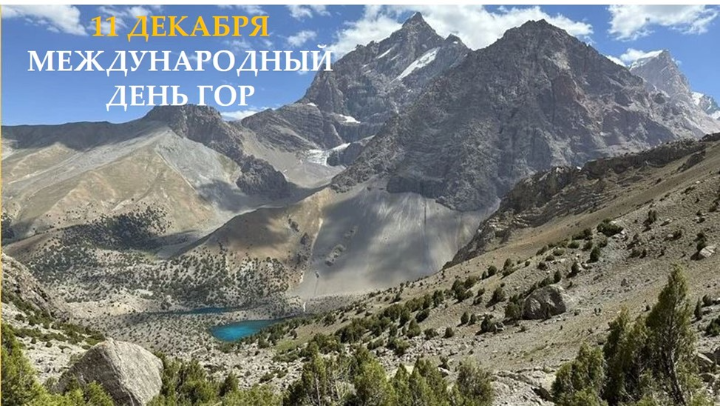December 1st is International Mountain Day
December 11 marks International Mountain Day, established by the decision of the 57th UN General Assembly in January 2003.
International Mountain Day was established in 1992 with the adoption of Agenda 21 by the United Nations Conference on Environment and Development, of which Chapter 13, entitled “Management of vulnerable ecosystems: sustainable mountain development”, was a milestone in the history of mountain development.
Mountains cover nearly one-quarter of the world's land surface, play a critical role in moving our world toward sustainable economic development, and are home to 15% of the population. They not only provide a source of livelihood and well-being for nearly 1.1 billion people living in mountainous regions, but indirectly benefit billions living at their foothills. And, of course, we must not forget that the mountains are a reserve for many unique species of plants and animals, the source of water for all the main rivers of the Earth.
The purpose of this day is not to congratulate all those “involved”, but to preserve the natural wealth of the world, support the indigenous inhabitants of mountainous areas, and raise people's awareness of the problems and importance of mountain ranges. Most holiday events take place in UN member countries.
But environmental deterioration leads to drought, landslides, landslides and other natural disasters in the mountains, and the aggravation of the political situation in mountainous regions leads to local wars, the spread of terrorism, an increase in the number of refugees, famine and disease. All this leads to the loss of the unique natural and human potential of mountain regions. Therefore, it is so important to attract the attention of the world community to these problems to preserve the mountains.
Mountains are fragile ecosystems of global importance as the source of most of the world's fresh water, home to unique biodiversity and rich cultural heritage, and a popular destination for recreation and tourism.
By the way, mountain tourism attracts from 15 to 20% of world tourism.
It should also be noted that every year a theme is determined for International Mountain Day, within the framework of which information materials are developed and events are held. Thus, over the years, the mottos of the Day were the words: “Peace: the key to sustainable development of mountain areas”, “Mountain tourism: how to make it work for the poor”, “Food security in the mountains”, “Disaster risk management in the mountains”, “ Mountain Minorities and Indigenous Peoples", "Mountains: Key to a Sustainable Future", "Mountain Culture: Diversity and Identity", "Mountains at Risk: Climate, Hunger, Migration", "The Meaning of Mountains", "Mountains and Youth", "Biodiversity" mountains”, “Sustainable mountain tourism”, “Women move mountains” and others.
Mountains are a natural wealth that we must protect. According to the UN, about 15% of all humanity lives in the mountains. About 50% of all biodiversity is found there. Approximately half of humanity depends on the various resources that mountains provide us. The more dangerous climate change, land degradation and any other negative changes in these areas become.
In Tajikistan, mountains make up 93% of the country's territory. About 70% of the population lives in the mountainous regions of Tajikistan, and half of the world's biodiversity is located in the mountains. The well-being of about half of the population depends on the water, food and energy resources that mountain ranges contain.
The wide variety of ecosystems, species and genetic resources make the mountains unique. Not only for traveling and “admiring”, but also for life.
Unfortunately, mountains are under threat due to climate change, land degradation, overexploitation and natural disasters.
Climate change has the greatest impact on rocks. Already, many people have begun to feel a lack of water and food. The melting of snowy peaks leads to avalanches, landslides and flooding of valleys. One in three mountain residents feel at risk of food insecurity.
As the climate warms further, mountain dwellers face even greater difficulties in the struggle for survival. Rising temperatures also mean that mountain glaciers are melting at an unprecedented rate, affecting freshwater supplies for millions of people.
This problem affects us all. We must reduce our carbon footprint and take care of these natural resources.
The Day's 2023 theme, Mountain Ecosystem Restoration, aims to raise awareness of the importance of mountain ecosystems and call for nature-based solutions, practices and investments that build resilience, reduce vulnerability and increase the ability of mountains to adapt to everyday threats and extreme climate events.

.png)
.png)









